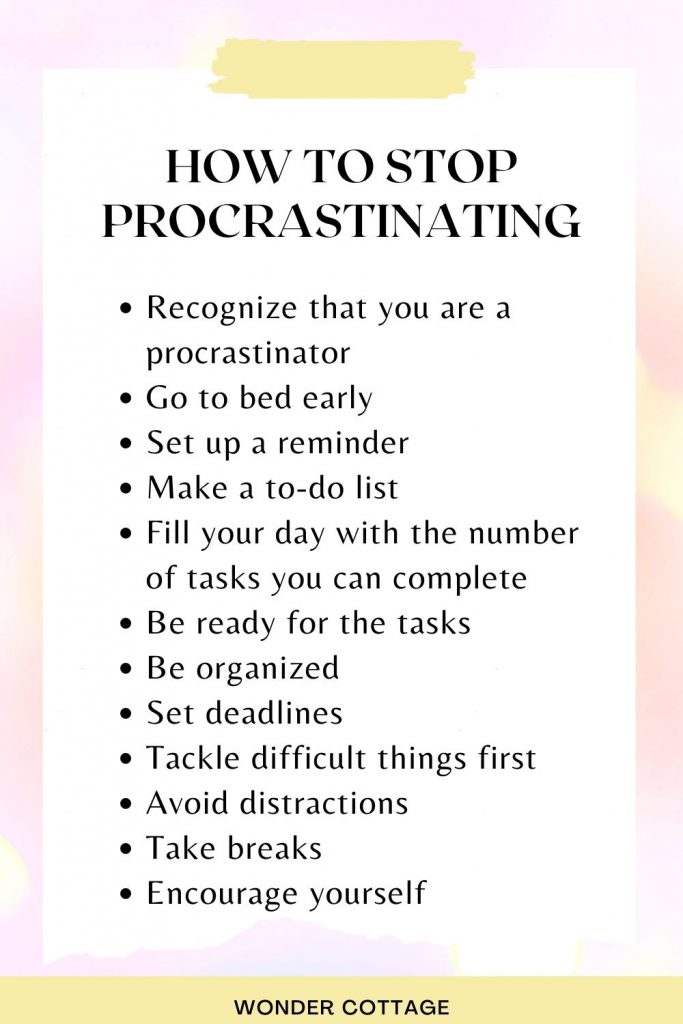Procrastination is simply the practice of putting off doing what you need to do. Let’s face it: quitting procrastination isn’t easy. We don’t procrastinate because we want to, but we do so because of psychological or emotional issues that affect our lives.
If you can’t seem to stop yourself from procrastinating, you’ve come to the right place. In this post, we are going to take a look at why we procrastinate and how to stop procrastination.

7 causes of procrastination
It’s impossible to overcome procrastination if you don’t understand why you procrastinate. If you’re a procrastinator, you’ve probably wondered why you engage in that behavior. You may have also promised yourself that you would stop procrastinating, yet you continue to do so.
Procrastination is linked to a variety of issues, including increased stress, poor physical and mental health, and the fear of failure to complete a project. We procrastinate when demotivation and other impediments overcome our self-control motivation.
Don’t be discouraged; you can overcome your procrastination. Here are some reasons why people may procrastinate;
Lack of motivation
Motivation is a key factor in productivity. When you lack motivation, it makes it difficult to complete a task that has been assigned to you. Lack of motivation can make you put off doing what needs to be done.
Motivation is essential for a company’s speedy expansion. Lack of motivation might make it difficult for someone to complete work that has been assigned to them. Lack of motivation can cause a reduction in productivity and the loss of employees.
Lack of adequate equipment
One common reason for postponing tasks is the lack of the necessary equipment or resources to complete them. Whether it’s a missing tool, outdated software, or insufficient funds, these limitations can hinder progress and demotivate individuals.
To overcome this challenge, it is essential to identify the missing elements and find suitable alternatives. This could involve seeking help from others, researching cost-effective options, or even borrowing necessary equipment. By addressing this issue head-on, you can eliminate the excuse of not having the right tools and move forward with your tasks.
Lack of energy
Completing tasks requires a certain amount of physical and mental energy. When we lack energy, whether from lack of sleep, poor diet, or overexertion, it becomes easier to procrastinate. To combat this, it’s crucial to prioritize self-care and ensure adequate rest, exercise, and a balanced diet.
Incorporating short breaks throughout the day and finding activities that energize you can also help to replenish your energy levels. By refueling your body and mind, you will have the stamina needed to tackle tasks head-on without the urge to delay.
Anxiety
Anxiety can be a significant hindrance when it comes to completing tasks. Feeling overwhelmed or uncertain can lead to a lack of focus, making it easier to procrastinate. To combat anxiety, it is vital to acknowledge and address your feelings.
Techniques such as deep breathing exercises, regular mindfulness practices, or seeking professional help can be instrumental in managing anxiety and improving concentration. Moreover, breaking down tasks into smaller, achievable goals can reduce feelings of overwhelm and boost your confidence.
Unpleasantness
It’s no surprise that we tend to put off tasks that we find boring, monotonous, or simply dislike for any reason. However, avoiding such tasks will only lead to more piled-up work and unnecessary stress. To overcome this avoidance, try breaking down the task into smaller, manageable parts.
By doing so, you can allocate short periods of time to complete each component without overwhelming yourself. Additionally, finding ways to make the task more engaging, such as incorporating music or gamifying it with rewards, can help to reframe your perspective and make it more enjoyable.
Fear of failure
When we fear failing a task, it often debilitates our morale and hinders our ability to approach it with confidence and enthusiasm. This fear can be particularly overwhelming when we are faced with the prospect of evaluation and harsh criticism. As a result, we find ourselves avoiding the task altogether, leading to procrastination.
Fear of evaluation
Whether it’s a performance review or constructive feedback from peers, the fear of being evaluated can be paralyzing. The mere thought of hearing negative comments can make us hesitant and cause us to put off completing the work assigned to us. Instead, we choose to delay the task, hoping to avoid any potential criticism or disappointment.

How to stop procrastinating
Recognize that you are a procrastinator
When we recognize that we do, in fact, have a bad habit, we are halfway to breaking that bad habit. Don’t let your procrastination get the best of you. This is a habit that we all share. Your recognition will aid you in figuring out how to break the habit of procrastination. In order to prevent you from procrastinating any longer.
Go to bed early
You won’t be able to get up early to attend to your responsibilities if you don’t go to bed early. This is one of the first things you should do to overcome procrastination. Go to bed early so that you can wake up early, refreshed, and ready to tackle the day’s tasks.
Set up a reminder
Set a reminder to help you keep track of your day’s activities. It will assist you in correctly allocating your time to your responsibilities as well as efficiently managing your time. You will know when to go about your chores successfully if you put up a reminder, rather than jumping into other periods you should have utilized to do other activities.
Fill your day with the number of tasks you can complete
Fill your day with a few simple tasks. When we are overburdened with a large number of tasks, we begin to procrastinate. Take care of one task at a time.
Related Posts
Make a to-do list
Make a list of the things you want to get done at the end of each day and work toward them. When you pull out the list, you’ll realize there’s more to do for the day, which will motivate you to work more.
When each task is completed, check it and then move on to the next task until you have completed all the tasks on your to-do list.
Be ready for the tasks
You will never attain good results if you are not truly prepared for something. Prepare for hurdles because you will likely experience them while you complete these chores, but be determined to overcome them. Stop relying on others; you will always fall behind in life if you do.
Be organized
Being organized is very important in work and productivity. Don’t begin a task if you don’t have in place the things you need. Make sure to get everything you will need to complete the task once you start.
Gather all the tools, equipment, and resources you will need for the task. Organizing everything makes it easy to work effectively. It also helps to keep track of all of your assignments and critical deadlines.
Set deadlines
Part of the reason we procrastinate is that we don’t establish a deadline for each task. It’s crucial to develop a timeline after you’ve set your goals. If you have any tasks, challenge yourself. Give yourself a due date and a due time to complete the tasks.
Tackle difficult things first
When things are difficult, you begin to procrastinate. As a result, in order to avoid pushing everything further back, start with the difficult tasks. When you’ve finished with the difficult tasks, it’ll be easier to go on to the simple ones.
Also, it is best to tackle the difficult tasks first because that is when you have more energy and your mind is refreshed enough to work on it.
Avoid distractions
There are a lot of things that can distract you from getting things done. Your phone, television, games, and social media are all things that can distract you.
Excessively texting your friends when you are supposed to be working, can result in you not getting things done and having to postpone.
If you are addicted to social media, it can be highly distractive. People can spend the entire day on Facebook, Twitter, and Instagram without doing any tasks that are assigned to them or even house chores they are supposed to get done. So get off social media.
Take breaks
Whiles, it is advisable to avoid distractions, it is also important to take breaks. This helps you to refresh your mind and re-energize. Sometimes, we procrastinate because we try to accomplish too many things at once, which isn’t healthy and can lead to burnout.
Identify the most important ones and focus on them first. Because each and every task takes time to do. Maintain a flexible schedule so that you can go to the movies or rest to help you renew your energy and stay refreshed. Work becomes less stressful when you take breaks.
Encourage yourself
We are always at a disadvantage in life when we believe we can’t perform things perfectly or that certain activities are difficult, and we will fail if we try.
Replace those negative thoughts with positive ones and tell yourself that you can do it. You know the saying that you are what you eat, that very much applies here.
The things you feed yourself can affect you. This includes the words you say to yourself, not just the food you eat. So say positive things to yourself, encourage yourself.
Procrastination is something that we all struggle with at one point or the other. But with these few tips, you should be able to beat procrastination.


